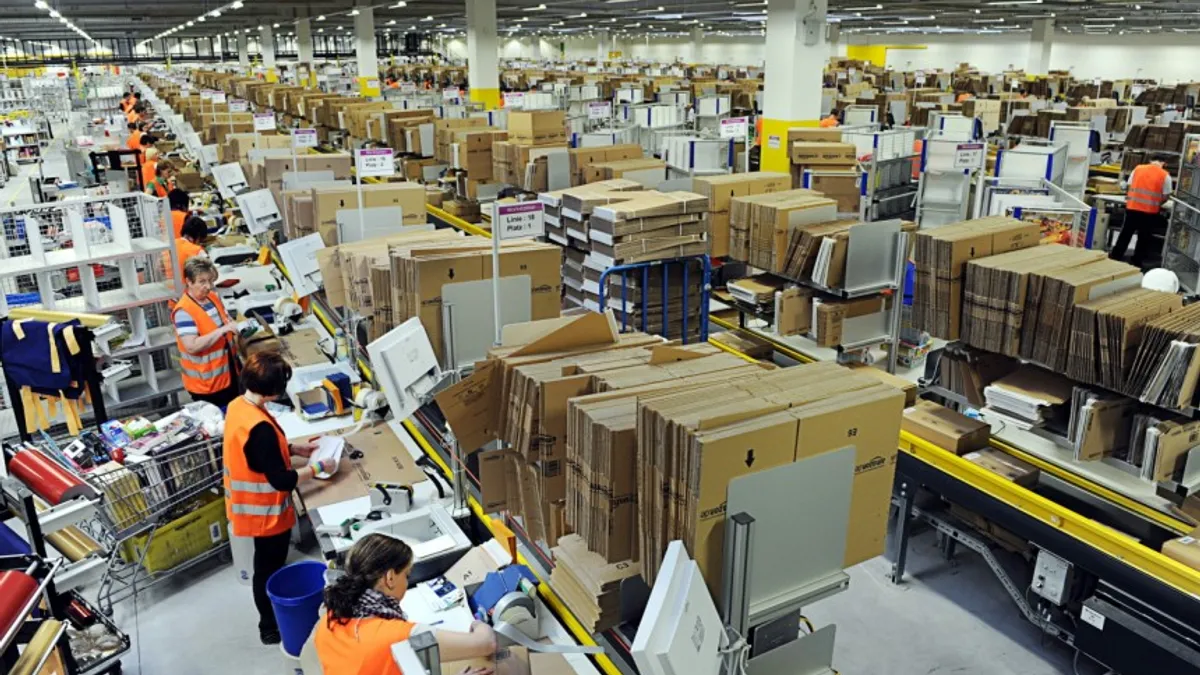Dive Brief:
- In a closely watched labor organization effort, Amazon workers in Bessemer, Alabama, voted by a wide margin not to unionize last week.
- The Retail, Wholesale and Department Store Union said in a press release it plans to mount a legal challenge to the election and accused Amazon of "unlawfully interfering" with the union vote.
- On its corporate website, Amazon thanked employees for participating in the vote and maintained that it did not intimidate workers from voting for the union.
Dive Insight:
Bessemer represents just one among more than 100 fulfillment centers that Amazon operates in the U.S. A union there, likewise the defeat of one, carries more symbolic weight than material for the company.
Yet, it still would have been a major win and potential beachhead for a long-flagging union movement that has yet to organize the workers of retail giants like Amazon, Walmart and Target.
By many accounts, Amazon treated the possibility of a unionized Bessemer as a major threat to its business. The Washington Post, which is owned by Amazon CEO and founder Jeff Bezos, reported in February that the company posted anti-union fliers in the Bessemer warehouse, including in front of restroom stalls. "Where will your dues go?" one bathroom flier read, according to the Post's reporting.
The newspaper described the Bessemer union vote as "the biggest labor battle in [Amazon's] history on U.S. soil."
RWDSU President Stuart Appelbaum said in a statement that Amazon "required all their employees to attend lecture after lecture, filled with mistruths and lies, where workers had to listen to the company demand they oppose the union"; "flooded the internet, the airwaves and social media with ads spreading misinformation"; "brought in dozens of outsiders and union-busters to walk the floor of the warehouse"; and "bombarded people with signs throughout the facility and with text messages and calls at home."
Amazon refuted the allegations of intimidation.
"It's easy to predict the union will say that Amazon won this election because we intimidated employees, but that's not true," the company said. "Our employees heard far more anti-Amazon messages from the union, policymakers, and media outlets than they heard from us. And Amazon didn't win — our employees made the choice to vote against joining a union."
The National Retail Federation chimed in as well, praising the vote against the union. "The process works and employees can make an informed decision despite the enormous scrutiny under which this campaign was conducted," the NRF's senior vice president for government relations, David French, said in a statement.
A labor fight within Amazon may well have been simmering for years. Among the company's financial and operating strengths are its agility, speed and efficiency. But some employees on the ground over the years have complained about a dearth of breaks, including for the bathroom; a physically punishing imperative for speed; intensive technological tracking of employees; lack of protections against COVID-19 and other issues. Many of those complaints the company has denied while also touting the pay and benefits of its warehouse jobs.
American's ailing union movement has targeted retail giants for years, after decades of job migration from the manufacturing to service sectors. While efforts at Walmart, Amazon and elsewhere have failed to date, many Democrats have taken up worker-friendly policies, such as a higher minimum wage, as major planks to the party's platform.
According to Amazon, fewer than 16% of the employees at the Bessemer facility voted to join the RWDSU union. After the vote, the big question is what, if anything, workers elsewhere in Amazon's massive operations will make of events in Bessemer and whether the vote will encourage other efforts.
















